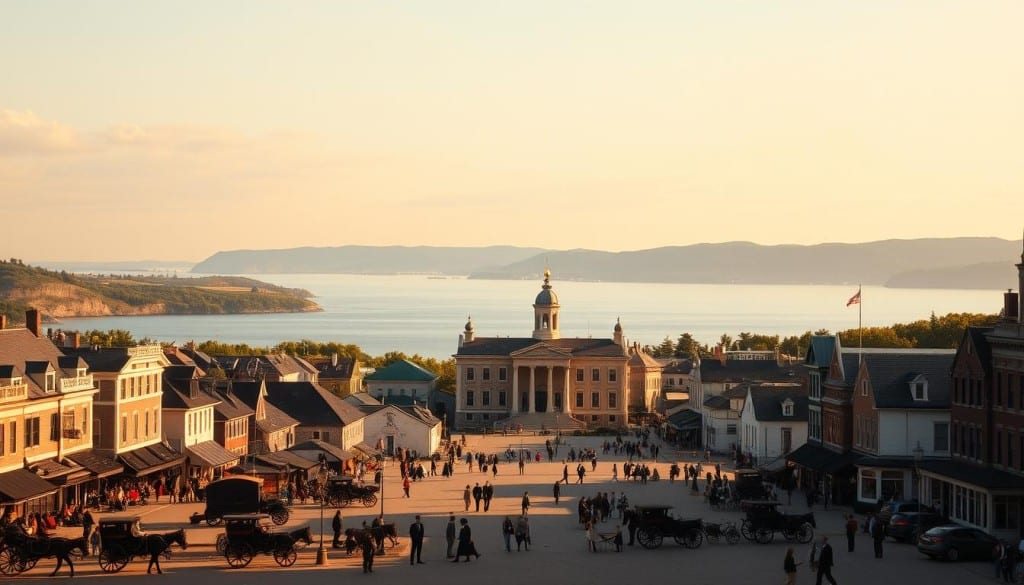Nova Scotia boasts over 13,300 kilometers of coastline. Its history is as detailed as the seas surrounding its shores. Featuring indigenous stories, European exploration, and enduring cultures, it’s key to Canada’s heritage. Nova Scotia’s history is a mariner’s tale, guiding us through time and shaping the province we love today.
This province’s history is linked with the Atlantic’s tides. Where bagpipes and sea breezes mix, there’s a deep heritage. From vibrant Halifax to peaceful Annapolis Valley, Nova Scotia’s past is as broad as the ocean.
Exploring Nova Scotia’s timeline reveals strength and allure. It was once called ‘The British Province by the Sea’, welcoming many since the 1870s. This hospitality spurred a tourism boom, making it the welcoming region we cherish.
Join us in a trip through time, seeing how Nova Scotia enchants us still. Welcome to Nova Scotia – where history lives beyond books, whispered by the sea and shared by its people.
Introduction to Nova Scotia’s Rich Heritage
Welcome to Nova Scotia, a place marked by history along its stunning coastlines. Here, we’ll delve into its rich cultural heritage and its major contributions to the Canadian economy. Join us in discovering the heart of Nova Scotia’s cultural and economic journey.
Discover the importance of Nova Scotia’s history in building a bright, sustainable future. Here, tradition and innovation blend in a way that attracts and inspires. This mix boosts local pride and brings communities closer together.
Overview of Nova Scotia’s Geographical Significance
Nova Scotia sits by the Atlantic, holding a key position in history thanks to its geography. Almost completely surrounded by the ocean, it has been a hub for ancient trade and vital maritime industries. These have been crucial in its economic and cultural development.
A Snapshot of Traditional Cultures
Nova Scotia’s culture is a vibrant patchwork, combining Indigenous, Gaelic, Acadian, and African Nova Scotian traditions. Fiddles sing in the highlands, while rhythmic beats sound at sea. Festivals, stories, arts, and food showcase the province’s enduring, adaptable spirit.
Experience the beauty and stories of Nova Scotia—where hidden stories await and communities greet you warmly. Together, let’s cherish and grow this land’s diverse cultures and histories, making Nova Scotia uniquely beautiful.
Indigenous Peoples: The First Inhabitants
Before European explorers reached Nova Scotia’s shores, the Mi’kmaq Nation flourished. They lived in harmony with nature, land, and sea. Their connection with nature and their social systems are vital parts of Nova Scotia’s Indigenous history. This history is alive today, shaping the province.
The Mi’kmaq, Nova Scotia’s original inhabitants, deeply influenced its culture and history. Through generations, they shared knowledge and traditions. These teach us about sustainable living and building strong communities, important in today’s world.
The Mi’kmaq Nation
The Mi’kmaq have been in Nova Scotia for thousands of years. Respect, balance, and spirituality are core to their culture. Their governance system, including the Grand Council, shows their advanced society. This system is among North America’s earliest.
Cultural Practices and Traditions
Mi’kmaq traditions show deep spirituality and connection to the earth. Sacred rituals, basket-weaving, and quillwork tell stories of Nova Scotia’s Indigenous history. These traditions enhance our understanding of the past and enrich modern Canadian culture. They remind us of our diverse roots.
European Exploration and Settlement
We honor the rich Acadian history in Nova Scotia by looking back at its beginnings. The first French arrivals in Nova Scotia were crucial. They laid the groundwork for Acadia. They intertwined the fates of locals and newcomers.
In the 1600s, French explorers sought new opportunities. They landed on what we now call Nova Scotia. Pierre Dugua, Sieur de Mons, and Samuel de Champlain were key figures. Their work started a vital relationship between natives and Europeans. This bond continues to shape Nova Scotia’s identity.

The founding of Acadia under French rule was a game of diplomacy and smart settlements. Places like Port-Royal were more than military bases. They were where Acadian culture blossomed, creating its unique identity.
| Year | Event | Significance |
|---|---|---|
| 1604 | Arrival of Pierre Dugua and party | Marked the beginning of continuous European presence |
| 1605 | Foundation of Port-Royal | Establishment of the first permanent European settlement in North America north of Florida |
| 1632 | Official recognition of Acadia by the Treaty of Saint-Germain-en-Laye | Consolidated French claims to territories in Nova Scotia |
Exploring the Acadian history in Nova Scotia reveals the foundation of its European ties. These early steps of exploration and settlement are vital. They highlight the start of Nova Scotia’s rich culture and community spirit.
The Acadian Expulsion: A Defining Moment
Nova Scotia’s history includes the Acadian Expulsion, a key event. It strongly influenced the area. Nova Scotia’s unique identity in Canada grew from this.
We need to grasp the reasons behind this drastic action and its effects on Acadian culture. Tensions and colonial fights led to their expulsion. This decision changed Acadian culture forever.
Causes of the Expulsion
In the mid-18th century, the British and French fought for control in Nova Scotia. This conflict led to the Grand Dérangement, or Great Upheaval. The British saw the French-speaking Acadians as a threat. When the Acadians didn’t fully pledge allegiance to Britain, their fate was sealed.
Impact on Acadian Culture
Removing over 10,000 Acadians affected their culture deeply. Families were torn apart. Acadian identity spread far, from Louisiana to other maritime regions. Yet, Acadian culture survived. Today, their language, music, and traditions thrive in Nova Scotia.
The Acadian Expulsion left deep wounds. Remembering and learning from this event is crucial.
Nova Scotia and the American Revolution
Nova Scotia’s political history was heavily influenced by its role in the American Revolution. It became a safe place for Loyalists, leaving a big impact on the province. This period played a key role in shaping its people and its path in Canadian history.
The impact of Loyalism on Nova Scotia was huge. It wasn’t just a small part of history. Many Loyalists came here for safety. They brought different skills and cultures that helped the local communities grow. We will look at how Loyalism and Nova Scotia’s strategic war role influenced things.
Loyalism and Its Consequences
The arrival of Loyalists changed Nova Scotia’s demographic and cultural scene. They brought a strong British loyalty. This greatly influenced Nova Scotia’s political landscape.
The Role of Nova Scotia in the War
Nova Scotia was an important naval and military base for the British. It provided a safe harbor and helped with military operations. This role boosted its economy during the war. It also made Nova Scotia important to the British Crown.
| Impact Area | Description |
|---|---|
| Demographic Shift | The arrival of thousands of Loyalists altered the province’s demographic landscape, creating a melting pot of ethnicities and traditions. |
| Economic Strategies | Loyalists introduced new skills and industries, significantly boosting local economies and shaping future economic policies. |
| Political Influence | The Loyalist influx strengthened pro-British sentiments, affecting provincial policies and Nova Scotia’s position within post-war British North America. |
Looking at these factors shows the American Revolution’s big role in making Nova Scotia what it is today. The effects of this time show the strength and ability to adapt of Nova Scotians through history.
The Birth of the Province: Confederation in 1867
In 1867, Canada changed forever when Nova Scotia joined the Canadian Confederation. This event was a key moment in Nova Scotia Confederation history . It didn’t just shape the country but also changed Nova Scotia deeply. Many leaders worked hard to make this union happen.

Nova Scotia pioneers played a vital part during this time. They faced many challenges in the new province. Their hard work laid the groundwork for Nova Scotia’s impact on Canada. Their story is one of strength and determination which still echoes in history.
Economic Development Through the Ages
Nova Scotia’s journey in economic growth is deeply rooted in its ocean setting. The lively docks and large shipyards have built a legacy. This legacy is both historic and economically rich, thanks to fishing and shipbuilding.
The fishing industry has been central to Nova Scotia’s economy for ages. It has molded our economic and cultural identity. Our seas have provided well for many generations. Shipbuilding helped our economy and connected us to worldwide trade and commerce.
Let’s take a closer look at these thriving industries. They have guided Nova Scotia through many years.
| Industry | Historical Significance | Impact on Economy |
|---|---|---|
| Fishing | Primary source of livelihood, sustenance for early settlers | Major contributor to GDP, exports |
| Shipbuilding | Linked to defence and trade | Creation of jobs, growth f trade channels |
Reflecting on Nova Scotia’s economic history, fishing and shipbuilding stand out. These industries are not just businesses; they are the backbone of our economy. They show our ability to adapt and overcome challenges. They tie our history to our present, motivating us with our maritime heritage.
Cultural Flourishing: Arts and Literature
In Eastern Canada, Nova Scotia’s culture has grown into a lively mix of arts and literature. It’s shaped by its Gaelic and Acadian roots. This blend keeps old traditions alive and sparks new creative works.
Looking into Nova Scotia’s culture through its artists tells a story of creativity and mixing cultures. Gaelic songs and Acadian poems show Nova Scotia’s soul.
| Artist | Art Form | Cultural Influence |
|---|---|---|
| Ernest Buckler | Literature | Acadian |
| Elizabeth Bishop | Poetry | General Nova Scotian |
| Johanna Skibsrud | Literature | General Nova Scotian |
| Stan Rogers | Folk Music | Gaelic |
Gaelic and Acadian cultures have hugely influenced Nova Scotia’s heritage. They give rich history and inspire artists to explore and express the Nova Scotian identity in many art forms.
Modern-Day Nova Scotia: A Blend of History and Innovation
In Nova Scotia today, history and the present merge in inspiring ways. The province’s deep heritage drives its progress. From Halifax’s lively streets to our scenic landscapes, history enriches Nova Scotia’s today.
The bond between Nova Scotia’s economic development history and innovation is strong. This connection shines in tourism, education, and historic preservation. It shows our dedication to protecting our culture while seeking new ideas.
| Aspect | Contribution to Economy | Role in Innovation |
|---|---|---|
| Tourism | Significant growth in hospitality and services sectors | Promotes innovation in sustainable practices and digital marketing |
| Educational Institutions | Development of skilled workforce | Research in preserving historic techniques and adapting them to modern needs |
| Historic Preservation | Attracts cultural tourism | Utilizes cutting-edge technology to preserve and showcase historical sites |
Tourism is key to our economy. Historical sites and natural beauty, like the History of Halifax , draw many visitors. This boosts jobs and supports local businesses.
Educational institutions are also crucial. They protect historic preservation and mix old techniques with new tech. This keeps our architectural and cultural past alive for all to see and learn.
We are proud of balancing our past and future. Preserving heritage and adopting new tech guides us. This drives Nova Scotia to greater economic and cultural success.
Conclusion: Celebrating Nova Scotia’s Legacy
Reflecting on Nova Scotia’s history shows us its importance in Canada. We honor the Mi’kmaq Nation and remember European settlers and confederation. These stories shape the rich and vibrant Nova Scotia we love today.
We’re proud of our heritage and excited for the future. Our community’s sense of identity and belonging grows stronger as our traditions are honored.
Looking to the Future
Nova Scotia is set for growth that respects our history and welcomes new ideas. We aim to keep our economy and culture thriving together. Keeping our history alive, we also embrace change and innovation.
This blend of old and new keeps our province dynamic. Our legacy is a living story, growing with each generation.
Inviting Exploration and Discovery
An invitation stands for everyone: locals and travelers seeking authenticity. Nova Scotia promises adventures from Cape Breton’s cliffs to the Bay of Fundy’s tides. We invite you to explore our culture, enjoy our festivals, and support local businesses.
Together, we’ll keep Nova Scotia’s spirit vibrant. Let’s share its beauty with the world.






